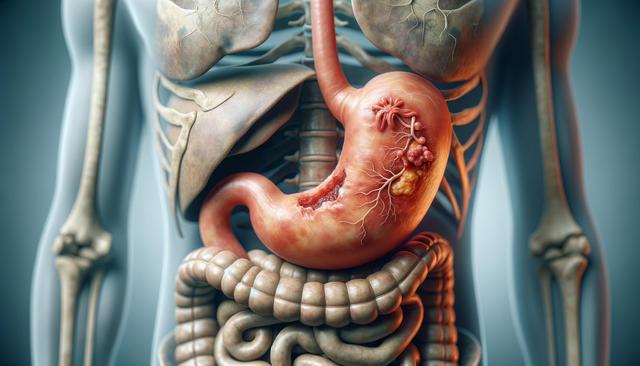Understanding the Early Signs of Stomach Cancer
Stomach cancer, also known as gastric cancer, often develops slowly over time. In its early stages, it may present subtle symptoms that are easy to overlook or confuse with common digestive issues. Recognizing these early signs can be crucial for timely diagnosis and treatment. Some of the initial symptoms include a persistent feeling of fullness after eating small amounts of food, mild but consistent stomach discomfort, and a general sense of fatigue. These symptoms may seem insignificant at first, but when they persist or occur together, they warrant medical evaluation.
Other early indications might include indigestion or heartburn that doesn’t improve with over-the-counter remedies, as well as bloating after meals. In some individuals, there may also be a noticeable decrease in appetite or a growing disinterest in food altogether. These changes, especially when paired with unexplained weight loss, should not be ignored. Regular health check-ups and communicating openly with healthcare providers about these symptoms can help in identifying stomach cancer at a more treatable stage.
Common Digestive Symptoms That May Signal a Problem
Because stomach cancer affects the digestive system, many of its symptoms are related to gastrointestinal discomfort. One of the most commonly reported symptoms is persistent nausea or vomiting, which may occur with or without eating. In some cases, vomiting may include blood or resemble coffee grounds in appearance, which can indicate bleeding in the stomach. A sensation of pressure or pain in the upper abdomen is another common symptom that should be monitored.
Changes in bowel habits can also occur, though they are less specific. These might include:
- Frequent bouts of constipation or diarrhea
- Dark, tarry stools that may indicate bleeding
- Feeling like the stomach is always bloated or distended
These signs may resemble other digestive conditions such as ulcers or gastritis, which is why proper medical assessment is essential. Ignoring these symptoms or attributing them to less serious issues can delay diagnosis and appropriate care.
Systemic Symptoms That Go Beyond the Stomach
Stomach cancer doesn’t only affect the gut; it can also produce symptoms that impact the entire body. One of the most noticeable is unintentional weight loss, which occurs even when no changes have been made to diet or exercise routines. This is often accompanied by a loss of appetite and a general sense of weakness or fatigue. These systemic symptoms may be a result of the body’s response to cancer and the reduced ability to absorb nutrients from food.
Other systemic changes to watch for include:
- Low red blood cell counts (anemia), leading to pale skin or shortness of breath
- Difficulty swallowing, especially as the tumor grows and obstructs the passage
- Swelling or fluid buildup in the abdomen due to cancer spread
These symptoms often suggest more advanced stages of the disease, making early attention to mild warning signs even more important. If these systemic symptoms arise suddenly or worsen over time, it’s critical to consult a healthcare professional promptly.
Risk Factors That May Increase Your Awareness
While symptoms are an essential part of recognizing stomach cancer, understanding the risk factors can help individuals stay more alert to potential warning signs. Certain lifestyle and medical factors are associated with a higher likelihood of developing gastric cancer. These include chronic infection with Helicobacter pylori bacteria, long-term inflammation of the stomach lining (gastritis), and a family history of stomach cancer. Individuals who smoke or consume a diet high in salted, smoked, or pickled foods may also be at increased risk.
Knowing your personal risk profile can aid in earlier detection. Consider the following risk elements:
- Age over 50
- Gender (males are generally more affected)
- Previous stomach surgery or polyps
- History of pernicious anemia or Epstein-Barr virus infection
Being aware of these factors can prompt earlier screenings and a more proactive approach to gastrointestinal health. It’s important to discuss your risk with a medical provider, especially if symptoms begin to arise or persist.
When to Seek Medical Attention
Many symptoms of stomach cancer overlap with less serious conditions, which can make it challenging to know when to seek help. However, if digestive issues persist for more than a few weeks, or if they worsen over time, it’s advisable to consult a healthcare provider. Stomach cancer is more treatable when caught early, and diagnostic tools like endoscopy, imaging, and biopsy can confirm the presence of abnormal cells before the disease progresses.
Key signs that require medical evaluation include:
- Unexplained and persistent stomach pain
- Ongoing nausea or vomiting
- Rapid weight loss without changes in diet
- Difficulty swallowing or feeling full after a small meal
- Stools that are black or contain blood
Early detection offers the best chance for effective treatment and recovery. Don’t hesitate to consult a doctor if you have concerns about your symptoms, especially if they align with those associated with stomach cancer.
Conclusion: Stay Informed and Proactive
Recognizing the early signs and symptoms of stomach cancer can make a substantial difference in outcomes. While many of the symptoms can be attributed to more common conditions, persistent or unexplained changes in digestion, appetite, or weight should never be ignored. Understanding your risk factors and staying alert to how your body feels are key steps in protecting your health. If you or someone you know is experiencing symptoms that may be linked to stomach cancer, seeking medical advice promptly can lead to earlier diagnosis and a wider range of treatment options. Staying informed and proactive is a powerful way to support your overall well-being.


